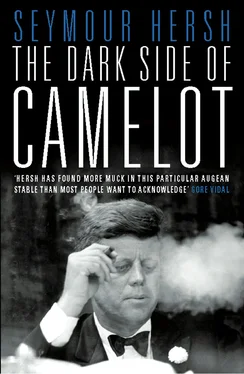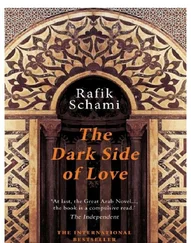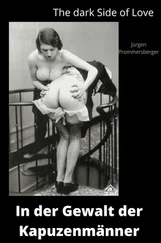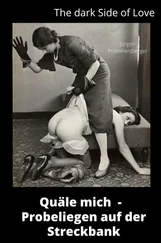Joe Kennedy’s political ambitions began at the top. He was ruthless, as we shall see, in his efforts while serving as President Roosevelt’s ambassador to England to collect adverse information about the president, in a poorly conceived attempt in 1940 to force FDR from office—and position himself as a viable candidate. Joe Kennedy’s political career was in ruins by the end of 1940, but he learned from his mistakes. His son Jack, emulating his grandfather, would develop a strong political base in Boston.
After his political disgrace, Honey Fitz remained loyal to the family, and did what his wealthy son-in-law told him to do. In 1942, at the age of seventy-nine, Fitzgerald served Joe’s needs by running as a spoiler in the Democratic senatorial primary in Massachusetts against an attractive New Deal Democrat named Joseph E. Casey, one of FDR’s favorites in the Congress. Fitzgerald, whose daily campaign activities were heavily subsidized by Kennedy—and carefully monitored by one of Joe’s high-powered and well-paid speechwriters—took 80,000 votes away from Casey in the primary, and inflicted so much damage that Republican Henry Cabot Lodge, Jr., won the general election easily. The defeat, as expected, embarrassed the president and seriously hurt the career of Casey, who was viewed by Kennedy as a potential threat to the political ambitions of his first-born son, Joe Jr., ambitions Joe nurtured until his son’s death in 1944. The Kennedys learned a vital lesson in 1942: even a very good candidate, like Joseph Casey, could be defeated with money.
Honey Fitz came into the limelight once again, in 1946, when Joe Kennedy turned to Jack, his eldest surviving son, as the family’s political heir. Jack came out of the war as a decorated navy hero of torpedo boat skirmishes; it was decided that he would campaign for Fitzgerald’s old seat in Congress * as one of ten candidates in the Democratic primary. The Kennedy public relations machine was turned loose again and the natural affinity between grandson and grandfather was put to work—with careful guidance from Joe, who remained in the background during the campaign, as he would throughout his son’s political career. Dozens of favorable news stories appeared as the young man and old man campaigned together in the working-class districts of Boston’s North End and West End, with the former mayor introducing his grandson to the city’s elders. Honey Fitz seemed to play a significant role in the campaign.
Jack Kennedy and his campaign workers understood, however, that Fitzgerald was an anachronism whose politics had little to do with postwar America. Robert Kennedy, in an interview for the Kennedy Library four years after his brother’s death, acknowledged that his grandfather’s political “effectiveness … was not overwhelming. He had some important introductions and contacts which were significant. But the appeal that John Kennedy had was to an entirely different group.” Kennedy added that his grandfather “felt very close to my brother.”
Jack Kennedy’s best friend, K. LeMoyne Billings, told interviewers after Kennedy’s assassination that grandson and grandfather “were absolutely crazy about each other. Jack was undoubtedly the old man’s favorite. He was a very attractive old man, full of the Irish blarney, full of mischief and full of life.… His humor was something that Jack loved so much; he adored his grandfather’s sense of humor.” As president, Jack would honor his grandfather’s memory—Fitzgerald died in 1950—by naming the presidential yacht the Honey Fitz .
Nonetheless, the family warmth was put aside at critical moments in 1946. Joe Kennedy, as usual, treated Honey Fitz contemptuously during his son’s first campaign, and Jack Kennedy, never able to stand up to his father, was unable to stand up for his beloved grandfather.
The chief adviser in the campaign, handpicked by Joe, was a hard-nosed Boston political operative named Joseph L. Kane, who had served as the political strategist for Peter Tague during his successful fight to reclaim his House seat from Honey Fitz in 1919. Kane, who was Joe Kennedy’s first cousin and childhood friend, had done little in subsequent years to hide his disdain for Honey Fitz, and did not spare him in 1946.
In an interview in the late 1950s, published in Front Runner, Dark Horse , a study of the 1960 campaign by journalists Ralph G. Martin and Ed Plaut, Kane told of the tense moment, early in the primary campaign, when Fitzgerald accidentally walked into a Kennedy strategy meeting. Kane yelled, “Get that son of a bitch out of here!” The startled young Kennedy said, “Who? Grandpa?” Fitzgerald was ushered away and Jack, his political career on the line, stayed put. Young Kennedy was learning to be as ruthless, if necessary, as his father. A few days later, a pleased Joe Kennedy praised his son’s ability to get along with the difficult Kane: “I didn’t think you’d last three hours with him,” Joe Kennedy said.
The famed Kennedy loyalty—father to sons, sons to father, and brother to brother—did not always extend, at election time, to grandfathers.
Joseph P. Kennedy, in his drive to elect Jack Kennedy in 1946, left nothing to chance—an approach he would repeat in every one of his son’s political campaigns. Kane was deemed essential, because the elder Kennedy was pouring hundreds of thousands of family dollars into the campaign; Kane, who spent forty years as a backroom political operative in Boston, knew whom to pay off and how much to pay. Kane’s political theory was very simple, as he told Martin and Plaut years later: “It takes three things to win: the first is money and the second is money and the third is money.” One primary rival was paid $7,500 to “stay in or get out,” depending on how the race was going. Yet another rival was neutralized when Kane paid to have someone with the same name enter the primary, inevitably confusing voters and splitting the vote. The Kennedy campaign bought up much of the available billboard space in the district, and advertised heavily on the radio. The campaign slogan, as devised by Kane, was appropriately vague: “The New Generation Offers a Leader.” * Thousands of leaflets and pamphlets bearing those words were mailed, and many of the eligible women voters were personally invited by mail to join with Kennedy family members at a swanky hotel reception a few days before the election. The response was overwhelming. Kane said that Joe Kennedy was used to paying for what he got. “They paid a staggering sum in the Congressional race of 1946, but Jack could have gone to Congress like everyone else for ten cents.”
John F. Kennedy campaigned vigorously and successfully for his grandfather’s old seat in Congress, and with enormous charm, intelligence, and growing confidence. His first campaign invoked strategies that would bring him continued political success: an early start, effective use of volunteers, and a ferociously loyal organization made up of family members, old friends, former schoolmates, and shipmates from his combat days in World War II, when Kennedy commanded PT-109 in the Pacific.
The essential lessons he learned in the 1946 campaign would stay with Jack Kennedy for the next fourteen years, as he moved away from the local politics of his grandfather and began his long run for the presidency: Good looks, good organization, and hard work were not enough. Above all, he needed his father—and his father’s noholds-barred spending.
* Redistricting changed Honey Fitz’s election district to the Eleventh by the time his grandson ran for office.
* Kennedy also was vague about his specific political views. In an interview during the 1946 campaign with Selig S. Harrison, then a staff reporter for the Harvard Crimson , Kennedy steadfastly refused to make any commitments. “Kennedy seems to feel honestly that he is not hedging, not playing politics,” Harrison wrote, “by refusing to offer a positive specific platform. He feigns an ignorance of much in the affairs of government and tells you to look at his record in two years to see what he stands for.” Recalling the interview in an essay for the New Republic in 1960, Harrison wrote, “It would be difficult to forget the irritation which Kennedy displayed when this reporter … peppered him with questions.…”
Читать дальше












